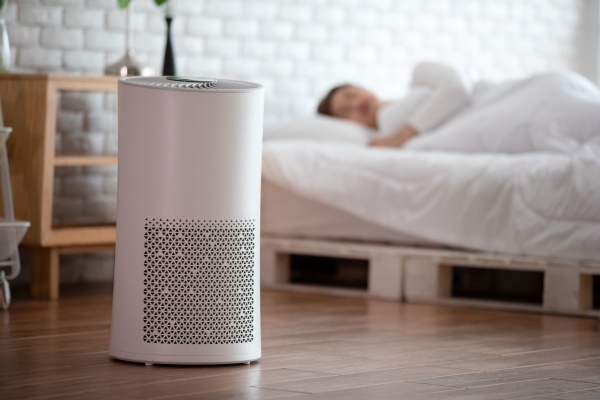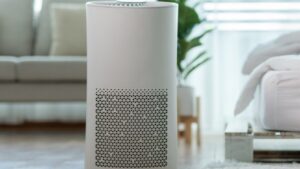
You or someone in your home have asthma may wonder if an air purifier can help. Asthma is a condition that affects the lungs, making it difficult to breathe. There are many different triggers for asthma, including smoke, pollen, and pet dander—an air purifier help to remove these triggers from the airbreathing easier to breathe. Keep reading to learn more about asthma and air purifiers.
Asthma is a respiratory condition where the airways in your lungs narrow and swell. When asthma has been triggered, muscles around these tighten to cause symptoms such as chest tightening or pressure; coughing up mucous plugs that won’t go away even after you’ve swallowed them (which can lead some people with asthma having trouble breathing); difficulty catching breath quickly because of an intense need for minute ventilation during activities like running across open ground where there are no barriers between yourself and outer environment factors.
Asthma Symptoms

According to National Health Service UK, the following are the common asthma symptoms:
- Wheezing
- Breathlessness
- Chest tightness
- Coughing
These symptoms are common and can easily be caused by anything else if they often reoccur if they worsen at night and early mornings, or if responses to common asthma triggers.
What is an Air Purifier?

An air purifier is a portable air cleaner used in various settings. Air purifiers are ideal for use in homes, offices, and other indoor spaces where polluted air can cause health problems. Using an air purifier can improve the quality of the air you breathe and create a healthier environment.
Difference Between Air Purifiers and Air Filters
An air filter catches contaminants by pushing the air through a filter; an air purifier does not do this. The only equipment that sanitizes the air is an air purifier, even though both catch and filter out impurities.
A portable air filter or one component of an HVAC system are both acceptable options.
Difference Between Air Purifiers and Air Humidifiers
Humidifiers, which provide moisture to the air to combat dryness, are distinct from air purifiers and filters. Humidifiers may make it easier for you to breathe. Still, they have no impact on allergens or other asthma environmental factors.
Common Asthma Triggers

Both inside and outside of your house, environmental asthma triggers exist. These aggravating and frequently hazardous factors that trigger an asthma attack or its symptoms include:
- Dust
- Gasses and odours
- Toxic and irritating chemicals
- Pet dander
- Mould
- Smoke
If you have asthma, the last thing that will help is a trigger in your home. Air purifiers can remove these harmful triggers and make breathing easier for respiratory problems like yours!
Air Purifiers for Asthma
Indoor pollution is a significant trigger for asthma attacks. This means you need to place an air purifier where it will be most used in your home. HEPA filters work great at cleaning up what’s inside our spaces from allergens and many smaller particles that cause health trouble! An air purifier will significantly lessen the number of asthma episodes you experience by eliminating the primary causes of asthma symptoms in your house.
The Asthma and Allergy Foundation of America (AAFA) says that it’s essential to clean up your environment if you have asthma. They recommend using an air purifier or having one installed to them help reduce symptoms. Still, removing any source that could trigger an episode altogether is the best way!
How to Choose Air Purifiers for Asthma
Good air purifiers help with asthma at a significant level as they remove indoor pollutants and indoor allergens that trigger asthma symptoms and improve the overall indoor air quality. Hence, the question remains, how do you choose a good air purifier for asthma?
Two main types of air purifiers can reduce the amount of particulate matter in your home. The first type is an “air-sterilizing” machine that traps and then destroys irritants instead of filtering them out with a HEPA filter like other models; these silent but powerful devices tend to be able clean less space than those containing this material because they need additional energy for operation due their high output power requirements (this means louder noise). For smaller rooms where you spend most time indoors–or if there’s little foot traffic bringing new outside breezes into the house.
For larger rooms with a lot of air movement from foot traffic, open windows or other polluting tools, an air purifier that utilizes a HEPA filter is the more practical option as it can cycle much faster. These types tend to make little noise due to their powerful fan pulling tainted outdoors into one side where it’s then cleansed before being cycled back out again without any form of interruption, which makes them quite handy if you want some peace while working on indoor projects around your home – though these may not be silent like some models claim!
Things to Consider
It would be best to consider these things when choosing between air purifiers for asthma to make sure you eradicate indoor allergens.
Efficiency
A high-efficiency filter is an essential thing in an air purifier. This device will remove at least 99% of trusted source particles 0.3 micrometres or more prominent, which means just three out of every 10 thousand fine dust-sized particles won’t make their way through this barrier.
Room Size
The size of your room and how often you plan on using the air purifier will be two essential factors in choosing one. You should also consider what type or model is most suitable for use within that space and its ability to deliver clean filtered breathing spaces with just enough efficiency!
Certification
The AAFA suggests air purifiers with certified filters suitable for those with asthma and allergies since they capture nearly 98% of airborne allergens.
Ozone-Free
Ozone is a gas produced by some ionizing air purifiers that can irritate the respiratory system. According to the Environmental Protection Agency, ozone does not remove airborne particles; Ionizing air purifiers could not be as effective as HEPA filters.
Do air purifiers improve breathing?
In simple terms, improving indoor air quality helps breathe easier. Air filters can reduce pollutants from the environment and remove them as well. Some of the drugs can cause allergic reactions.
What air is best for asthma?
There are many benefits to living in a temperature-controlled environment. For one, it’s much easier on your respiratory system! The best ranges for asthma patients are between 68 – 70 degrees (22 ° F & 21 C). It may seem chilly at first, but the cool air won’t make you cough or sneeze as much once you get used to its effects; plus, humidity levels will remain low inside homes where fans can help distribute this freshness throughout every room
Conclusion
Asthma is a common respiratory condition that can make it difficult to breathe. There are many different triggers for asthma, including smoke, pollen, and pet dander. Air purifiers help remove these triggers from the air, making breathing easier. If you or someone in your home may wonder if an air purifier can help with asthma symptoms, check out the tips on choosing the best air purifier for your needs and lifestyle. With so many options available on the market today, there is sure to be an air purifier perfect for you!
Last Updated on
- Features to look for in an exhaust fan - September 26, 2022
- How to calculate CFM for exhaust fan - September 24, 2022
- Kitchen Fan Installation – Everything You Need to Know - September 20, 2022
